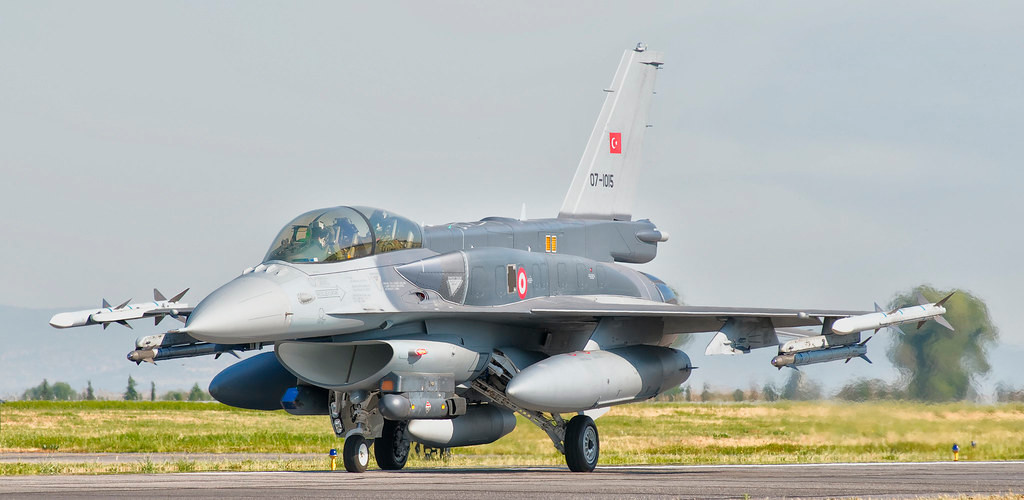Fatih Yurtsever*
Turkey has requested from the United States the purchase of 40 Lockheed Martin-built F-16 fighter jets and 80 upgrade kits for its aging fleet. The intended purchase, valued at approximately $7 billion, was announced just one day after President Recep Tayyip Erdoğan met with Russian President Vladimir Putin in Sochi, on Sept 29. After this meeting, Erdoğan had declared that Turkey intends to deepen defense cooperation with Russia by working on fighter engines, submarines and rocket motors and by the procurement of a second batch of S-400 missiles.
Erdoğan’s simultaneous request for F-16s from the US and his statement that “we will develop defense industry links with Russia,” despite the US’s stance on the S-400s, may be regarded as paradoxical. It’s clear that the Turkish Air Force requires fighter jets. Therefore, the most realistic way to close this gap is to acquire additional F-16s and modification kits from the United States and renew aging aircraft as an interim solution. The United States removed Turkey from the F-35 program and subsequently imposed Countering America’s Adversaries Through Sanctions Act (CAATSA) restrictions in response to the S-400 purchase from Russia, with the result that US arms sales to Turkey have been limited.
Congress has made clear on numerous occasions that it would not sanction arms sales to Turkey unless the S-400s are removed from Turkish soil. Senator Robert Menendez, chairman of the Senate Foreign Relations Committee, stated that “I do not see any new sales of [US] weapons systems in Turkey, unless there is a dramatic change in the conduct of the S-400s” during the confirmation hearing of former senator Jeff Flake, US President Joe Biden’s nominee to be the next ambassador to Turkey. Then why is Erdoğan requesting F-16s even though he can’t purchase weapons from the United States while simultaneously strengthening military bonds with Russia in the defense industry?
The Turkish Air Force (TAF) was in a crisis following a failed coup in July 2016. The coup attempt led to a halving of TAF’s pilot pool — from 1,350 to 680. TAF had to recruit Pakistani pilots to train its own F-16 pilots. TAF has a total of 270 F-16C/D aircraft in its inventory, all of them Block 30/40/50 models. Additionally, the Turkish F-16 fleet has been heavily employed for border patrol since the start of the Syrian civil war, counter-Kurdistan Workers’ Party (PKK) missions since 2015 and in support of Turkish operations in Syria’s Idlib in 2020. Most of these aircraft will have to be phased out over the next 10 to 15 years, depending on their upgrades.
Turkey’s removal from the F-35 program, delays in developing its first indigenous fighter jet, the TF-X, and the aging of its existing F-16s would result in significant deficiencies in its aerial warfare capability. At the same time, as Greece, Israel, and Egypt strengthen their air forces, Turkey’s security in the Aegean and eastern Mediterranean may deteriorate as the balance of air power shifts against it. Moreover, these air forces can support their naval forces in the ASFAO (Anti-surface air operations) role against Turkish naval assets to diminish Turkey’s naval deterrence in the Aegean and eastern Mediterranean.
Therefore, Turkey’s request for additional F-16s is the most sensible course of action under the present circumstances. The procurement of new F-16s in conjunction with a thorough upgrade of current ones would be an appropriate interim option.
On the other hand, Turkey’s F-16 request came one day after the Erdogan-Putin summit. The subsequent developments indicate that the request was not made for military purposes but rather to advance Erdoğan’s covert objective. Legitimacy is paramount to keeping relations tight with the Western countries, which is vital for Erdoğan’s political life. As a result, Erdoğan believes that meeting with Biden and sharing a photograph together would shift the home and foreign political balances in his favor. At the NATO Defense Ministers’ conference, adopting a new military strategy for Russia and the expansion of NATO’s presence in the Black Sea moved Turkey militarily to the forefront. Contrary to popular perception, Turkey and Russia do not have a strategic partnership.
Although constructing an authoritarian regime, Erdoğan is attempting to maintain membership in the Western system by using the threat of rapprochement with Russia. Putin, too, is assessing the situation and trying to extract as many concessions as possible from Turkey. Thanks to this attitude, Erdogan has gotten what he wanted so far. Erdoğan, using the same logic and citing military considerations, wanted F-16s from the Biden administration. Unfortunately, the responses from the United States demonstrate that Congress continues to take a challenging position on arms sales.
However, the Biden administration will not want to exacerbate the acidic environment in NATO following AUKUS by denying the request from Turkey because the United States holds B-61 nuclear bombs at Incirlik Air Base in Turkey, and these bombs can be deployed on F-16 aircraft. Turkey’s 6th Main Jet Base in Bandırma, which has F-16 fighter jets, is one of NATO’s three nuclear-carrier capable units.
On the other hand, the fact that the US acted in concert with nine other nations during a recent ambassador crisis implies that it will work with the Western alliance rather than take unilateral action against Turkey. The Erdoğan administration is aware of the US’s course of action, as demonstrated by Defense Minister Hulusi Akar’s warning that the US’s rejection of the sale of F-16s would undermine Turkey and NATO. Yes, Erdoğan took a risky step in seeking a bilateral meeting with President Biden right after his request for F-16s. But it is critical for Erdoğan to demonstrate that he still has good relations with the US by meeting with Biden, even though such a meeting has the potential to deteriorate the relations more than expected. Let’s see if he gets lucky this time.
* Fatih Yurtsever is a former naval officer in the Turkish Armed Forces. He is using a pseudonym out of security concerns.


